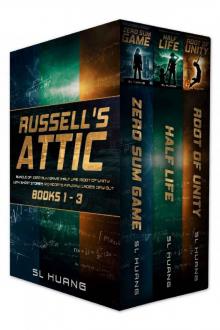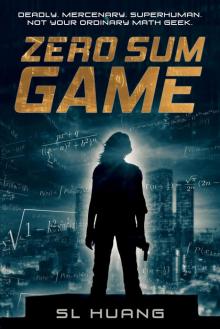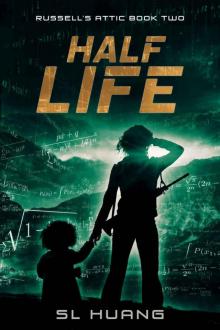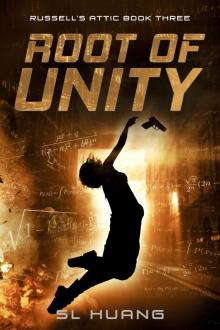Zero Sum Game Read online
Page 19
“Maybe.”
“It was my fault I was there just as much as yours,” I said. “I came uninvited in the first place, remember?”
He exhaled sharply and unhappily. “Any idea why they want you?”
It was a good question. Two nights ago they’d tried to kill me with no questions asked, and now they had set a trap for me? The only good guess my earlier brooding had come up with was that this all had to do with my minimal ability to break away from Dawna’s brainwashing after the fact. Of course, considering how easily she had gotten to me during our meeting at the coffee shop, and how profoundly the effect had lasted before Rio’s insistent intervention, I didn’t have much hope of the supposed resistance helping me out now.
“I guess I’ll find out,” I said.
“Yeah.” Arthur was looking at his hands, still reflexively rubbing them against each other. “You know, you could’ve run, when they threatened me.”
“No, I couldn’t have.”
He glanced at me and then nodded, as if he understood what I meant.
Absurdly, I felt as if I had passed some sort of test. “Besides, you would have done the same for me,” I pointed out, embarrassed.
“Yeah, but I got a reputation for self-sacrificing idiocy to uphold.”
“Well. We all have our flaws.”
He huffed out a breath that sounded almost like a laugh, and any tension that had remained after the last time we saw each other slipped away. Arthur went to sit down on the floor, leaning back against the wall, and I joined him on the other side of the barred partition dividing our cells while I factored another hundred or so integers. Most of them were easy, but I’d just hit a frustrating one that might be a semiprime.
“What do you think’s going to happen here?” asked Arthur after a while.
“I think Dawna Polk is going to come talk to us,” I said. “And then we’re going to do whatever she wants.”
“You got a plan?”
The Euclidean algorithm flickered through each subsequent remainder, subtracting and dividing and subtracting. “Resist as much as I can, I guess.” Of course, Dawna could make me think I was resisting when I was doing exactly what she wanted me to do. We would both be her babbling lap dogs eventually.
What had Rio said? That the conversion would take time, if her goal went fundamentally against her victim’s personality? Months, even, for a result opposite to the person’s psychology?
What was my psychology? Axiomatic, probably, but I’d already witnessed her ability to rewrite those axioms to let me rationalize anything. I had no defense against her. Neither of us did.
“I ain’t never been one to consider suicide an appropriate solution,” said Tresting beside me, “but in this case…”
I snapped my head around to look at him. Killing myself hadn’t even occurred to me. “Well, I guess that’s one way to avoid her influence,” I managed.
“Avoid it, and make sure she ain’t never make me do nothing to my—to anyone I cared about. Or anyone else.”
If his main concern was being used as a tool to hurt others, then he was definitely the better person. “I…if you want to do that, I can make it quick,” I offered, the words dry in my mouth.
“Thank you,” he said quietly. “I’ll let you know.”
We lapsed into silence. Eventually I curled up on the cement floor and tried for some sleep. One of the guards brought us food and water every few hours, and Arthur was graceful about turning away when I needed to use the steel toilet affixed to the wall. The wait was humane, if tedious.
I noticed my chronic headaches had gone away. Instead of being a relief, their sudden lack only spurred my anxiety. The headaches had come on whenever I resisted Dawna’s influence—what did it mean that I didn’t feel them anymore?
Fuck. I buried myself in more mathematics. It was all I could do.
Busy with my constant stream of monotonous mental arithmetic, I didn’t bother to keep track of the time, but at least a full day had passed before the door at the end of the cellblock opened again to reveal a familiar frizzy-haired and freckle-faced figure.
“Hi,” said Courtney Polk, coming down the cellblock to face us.
Arthur and I stepped forward in our cells. “Hi,” I said warily.
The staggering number of question marks surrounding Courtney surged to the front of my brain. Was she in league with Pithica and Dawna? If so, how much through her own free will, and how much through Dawna’s psychic brainwashing? Had she really killed Reginald Kingsley, and if she’d done it under Dawna’s influence, how much could she be held accountable?
Who was she? Was she still my client? And if so, what on earth could I do for her?
“I’m sorry you have to go through all this,” said Courtney, waving a hand at the cells. “It’s for your own good and all, but I’m still sorry.”
“What do you mean, it’s for our own good?” I said cautiously.
“Well, my sister. She’s helping you.” The corner of her mouth quirked up in a friendly smile.
Arthur and I glanced at each other.
“Helping us how?” I said.
“Become better.” She spoke like it was the most obvious thing in the world.
“That what she did for you, sweetheart?” asked Arthur.
Courtney’s smile blossomed. “It’s what she does, my sister. She’s amazing. The most amazing person in the world. I was so lost before she helped me.”
This conversation was surreal. “She’s not really your sister, you know,” I blurted.
Courtney didn’t seem bothered. “She is in every way that matters.”
“I didn’t see her helping when the cartel snatched you,” I said.
“Of course she did. Didn’t she hire you?”
I boggled. Well, I supposed that was one way of looking at things—if Dawna weren’t a freaking psychic.
“She couldn’t get me out of there herself, but afterward she came to get me as soon as she could,” Courtney explained.
I found my voice. “Let me drop a little knowledge on you,” I said. “Your sister can do pretty much anything she wants. She could have walked into that compound and walked you right out of the cartel’s custody if she’d wanted to, but for some reason, she didn’t. I’m sorry, but all you are is a pawn in some huge game she’s playing.” I took a deep breath. “Look, I said I’d help you. I’m still willing to.”
“That’s nice of you,” said Courtney delicately, in the same transparently fake way I might have if a high school student had offered to tutor me in arithmetic. “Really, I appreciate it. But Dawna’s fixing everything, just like always. No faraway island. No running away. And my life’s going to have meaning. Real meaning.”
“Doing what?” I said.
“Helping her.” The smile was back, her eyes sparkling.
Arthur cleared his throat. “Sweetheart, what does your sister want to do?”
“What else? Change the world.”
I bit back on an incredulous exclamation about vacuous truths. “Change the world how?” I pressed instead.
“Make it better. What else!” Courtney almost laughed at my slow-wittedness. “So many horrible things happen in the world. Like the drug cartels. But not just them. People doing awful, cruel things to each other, people starving, and war, and Dawna and everyone else are working to put a stop to all that. They’re doing so much good. And I’m going to help them, and I hope you will, too.”
“Wait. Let me get this straight.” My thoughts whirled. “Dawna’s goal is to make the world a better place?”
Courtney blinked at me. “What else would it be?”
I had been thinking along the lines of being an evil mastermind and making everyone her slave. Although perhaps such a dystopia was the same thing in her mind, if she forced all her slaves to play nicely together and made sure they all had enough food…after all, I thought ironically, wouldn’t that make for a mighty peaceful world?
Some detached part of my brain
wondered what Courtney had been like before she met Dawna Polk. Whether she had been anything like this Courtney, or whether that original girl was gone now, forever. “If you’re all wanting to be such good people,” I probed, “then why are Arthur and I locked up here? Shouldn’t you let us go?”
Courtney bit her lip. “I—I like you. I do. And you tried to help me out a lot, in your own way. But people like you…you shouldn’t be on the streets.” She regarded me sadly. “You hurt people. I’ve seen it. And you’ve killed people, and you steal for people, and—-we’re trying to change the world for the better, put away the people causing all the chaos, and right now, you’re one of them.” She scrunched up her face uncomfortably, then added to Arthur, “And I don’t know you, sorry, but I’m sure Dawna has a good reason for having you here, too. She always does.”
“But you said you hoped we’d work with you—you all,” I protested, knowing I’d lost the argument before I even began.
“Yes, we do, after you turn away from all of that. Dawna will help you.” She was smiling again. It was eerie.
“What if I already have?” I tried in some desperation. “Turned away from the dark side, and all that? You’ve explained it, uh, really well, and I, I want to change and come and join you. I’ve seen the light, I swear. Will you let us out?”
The words sounded so cringingly insincere to my own ears that I wasn’t surprised when Courtney laughed gently. Apparently being brainwashed didn’t make her stupid. “When it’s for real, when you really do want to join us, I know we’d love to have you. I’d love to have you. And Dawna, she’s so forgiving, and—well, she’s really the best sister ever.” Her smile had gone all glowing and hopeful. “I think she’s going to come and talk to you pretty soon. She’ll be able to help you. You’ll see. I’ll come visit you after?”
“Sure,” I managed. I wanted to rage at her, to lose my temper, but all I could muster up was pity. Pity for Courtney, and fear for myself.
Courtney’s face lit up even more. “Great! I’ll see you then, ’kay? It was nice to meet you,” she added to Arthur, despite never having introduced herself, and then she turned and tripped off down the cellblock.
“In a way, she’s right,” said Arthur, as the door clanged shut behind her. “People like you and me. In a perfect society, we wouldn’t exist.”
I wasn’t in the mood for philosophizing. “When we live in a perfect society, you let me know.”
He leaned his back against the bars across from me. “Well, sometimes I ain’t sure I even make it a better one. Lord knows I try, but…well. I do lots of things I ain’t proud of these days. Suspect I won’t weigh out so well on the scales of judgment my own self. Maybe she got a point.”
I turned on him incredulously. “Do you really think what Dawna does is—”
“I ain’t saying it’s justified,” he interrupted, still in a contemplative tone. “But if she really is trying to improve things—I dunno, she could have worse targets than you and me.”
“What about Courtney?” I said tartly. “What about Dr. Kingsley? And Reginald Kingsley? And all those people in his file? And who gave Dawna Polk the right to choose in the first place, anyhow?”
“Calm down. I ain’t saying I agree with all the methods here. But a greater good thing that got out of hand—well, makes some sense, don’t it? And if we are talking greater good, I ain’t sure you and me would be on the side of the righteous, is all.”
I didn’t know what shook me more—that Arthur seemed to be able to see the side of the woman who currently had him locked up pending brainwashing, or that he was including himself on the same ethical level as me. After he had come down on me for my relative immorality the other day, hearing him so insecure about his own inconsistencies of principle was vaguely shocking.
Maybe that’s why I said what I said next. Maybe it was the impending certainty of my mind getting twisted into pretzels that made frank soul-baring suddenly more appealing. Or maybe I figured it didn’t matter what I said to Arthur anyway, as his mind was about to get twisted into pretzels, too.
“Whatever your scales of judgment are, you’ll weigh on them a sight better than I will,” I admitted, my voice cracking a little. “You at least try. I…I survive.” I swallowed. “I’ve been thinking about it, and you were right, before. I don’t think a whole lot about the people I hurt, and killing someone who’s threatening me—it’s always been the smart thing to do. You pointed it out yourself—I would have killed you too, back at the motel.” I felt as if I were making a deathbed confession. Perhaps I was. “I don’t think I’m a very good person,” I added softly.
“You’re wrong about one thing,” Arthur remonstrated gently. “You didn’t kill me.”
“Only because you’re right—I didn’t have the leverage.”
“No. Talking about after. You knocked me out, and then you left me alive.”
“You weren’t a threat anymore.”
“Yes, I was,” he corrected. “And you knew I could be.”
I frowned. He was right. Mathematical expectation had been that I was in the clear, but he had started out by pointing a gun at me, and the probability he would have been able to come after me again had definitely been nonzero. In point of fact, he had come after me again. Why had I left him alive?
“I thought you were a cop at the time,” I remembered. “Murdering law enforcement—too many complications.”
“And that why you didn’t do it?”
“Well, no.” The idea of dispatching him once the immediate threat was over hadn’t even crossed my mind, which seemed oddly illogical of me, looking back. “I guess the smart thing would’ve been to consider it.”
He chuckled. “You on some crusade to make me think poorly of you?”
“Fine,” I conceded peevishly. “So I don’t kill gratuitously. That’s a high recommendation. I’m sure it’s the stand-out essay God gets on ‘why I should get into heaven.’”
“Don’t sell yourself short, Russell. World’s a big place, and you got a lot of people beat just with that.”
“What happened to telling me I’m too violent and immoral?”
“Well, you are. But maybe so am I. We ain’t neither of us angels, I guess. And I don’t know; I think there’s hope for you. Maybe for me, too.”
“That’s comforting,” I said. “What’s your point, then? That we’re not the good guys, but Pithica should still let us go because we’re not the worst of the bad guys either and there might even be some hope of redemption?”
He smiled at my phrasing. “Just ruminating here, honest. Maybe we’re all shades of gray—you, me, Dawna Polk trying for her greater good…”
I thought of what Dawna Polk had done to me, to Leena Kingsley, to so many other people—and what else she would do to Arthur and me very soon now.
“No, I’m pretty sure we kill Dawna as soon as we can,” I said, “and redemption be damned.”
Arthur chuckled again. He probably he didn’t realize I was serious.
Chapter 24
When Dawna finally came, she came for me.
Two of her black-clad troops arrived in the cellblock and courteously requested I accompany them. I glanced at Arthur; his expression was heavy with worry.
I took the barest of moments to glance out from behind my shield of tedious arithmetic to evaluate the weighty, locked door at the end of the cellblock and wonder if I could jump the guards (probably) and get Arthur and myself out and through the door in one piece before an army of troops arrived (unlikely). As much as I preferred to go down fighting, committing suicide via an almost zero-probability escape attempt appealed to me about as much as bashing my brains out in the cell did. Waiting for a more opportune time was the obvious answer…though it might be hubris to think I could survive even one interview with Dawna and stay an intact person.
I stepped up the arithmetical white noise in my brain, filling every neuron with a mess of calculation, so much I had trouble juggling it all.
The troopers took me down several cinder block corridors and through a few more heavy metal doors, and then up a lengthy ride in an elevator that opened into a well-furnished hallway of what appeared to be a luxury estate. We stepped out. The carpet was so thick under my boots that it not only muffled all sound of our passage but had its own spring, and the paramilitary troops looked strangely out of place against the spotless decor and tastefully framed paintings.
They led me down several plush corridors before finally ushering me through a shining set of carved double doors and into a library, where one gestured for me to sit at a long table. Rows of stacks spread out to either side, every shelf filled with hardcovers in pristine condition.
“Please wait here,” said one of the troopers, a woman with a stark military haircut. “In the meantime, we have been instructed to remind you, with apologies, that your friend’s continued well-being is contingent upon your choices.”
“Yeah, I get it,” I said. I wondered how far Dawna thought she could push me using that leverage. Hell, she probably already knew exactly how far. I peeked at the math around me again—the probabilities bounced into a much more favorable array, tantalizing me with escape, but I still believed that Dawna’s threat was good and that they would hurt Arthur very badly if I tried. I wasn’t ready to risk that.
I sat in the comfortable, well-upholstered chair and waited, counting the time, overflowing my brain with pointless mathematical grunge work. My chaperones retreated to the door but stayed in the room, presumably prepared to shoot me or tell on me if I tried anything.
The small part of my mind that wasn’t cycling through repetitive NP-hard and EXPTIME algorithms wandered. Why the heck did Pithica have a library here? What was this building to them? Like in the hallways, the decor here struck me as luxurious but impersonal; maybe the room was only for show—though why anyone would need a library for show, I had no idea.
“It’s not a pretense,” said an articulate female voice. I jumped, reflexively stepping up my arithmetic mental scramble. Dawna had entered the room, the thick carpeting muffling her elegant stilettos. She stood with her hands clasped behind her back in a light approximation of parade rest, wearing a crisp business skirt and blouse. Her gracefulness made me feel positively trollish as a human being. “I have a library here because I enjoy books,” she continued with a small smile. “I have a particular proclivity for first editions.”

 Russell's Attic, Books 1 - 3
Russell's Attic, Books 1 - 3 Zero Sum Game
Zero Sum Game Half Life (Russell's Attic Book 2)
Half Life (Russell's Attic Book 2) A Neurological Study on the Effects of Canine Appeal on Psychopathy, or, RIO ADOPTS A PUPPY: A Russell's Attic Interstitial
A Neurological Study on the Effects of Canine Appeal on Psychopathy, or, RIO ADOPTS A PUPPY: A Russell's Attic Interstitial Root of Unity
Root of Unity